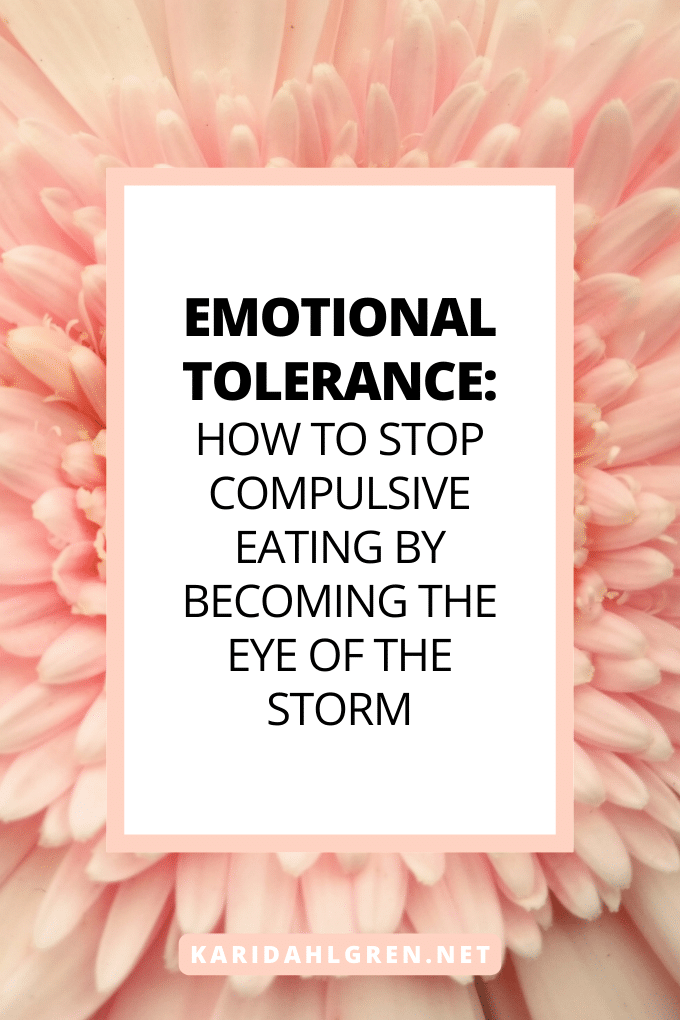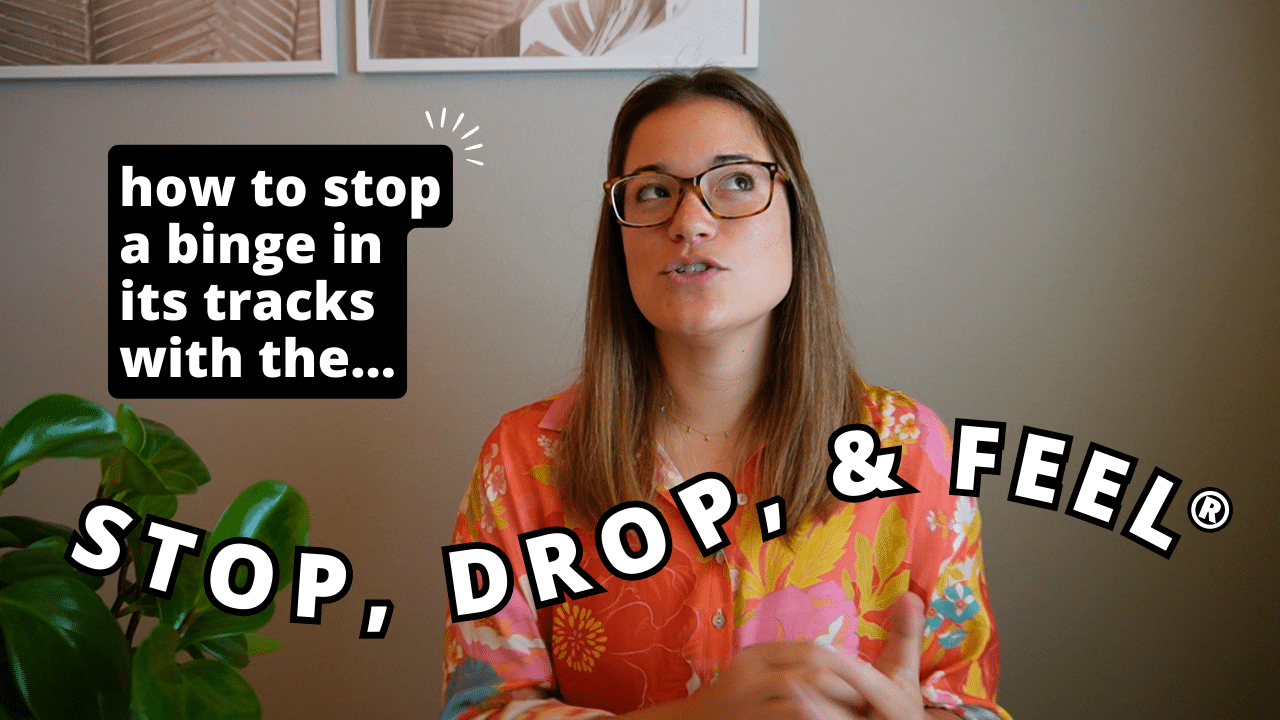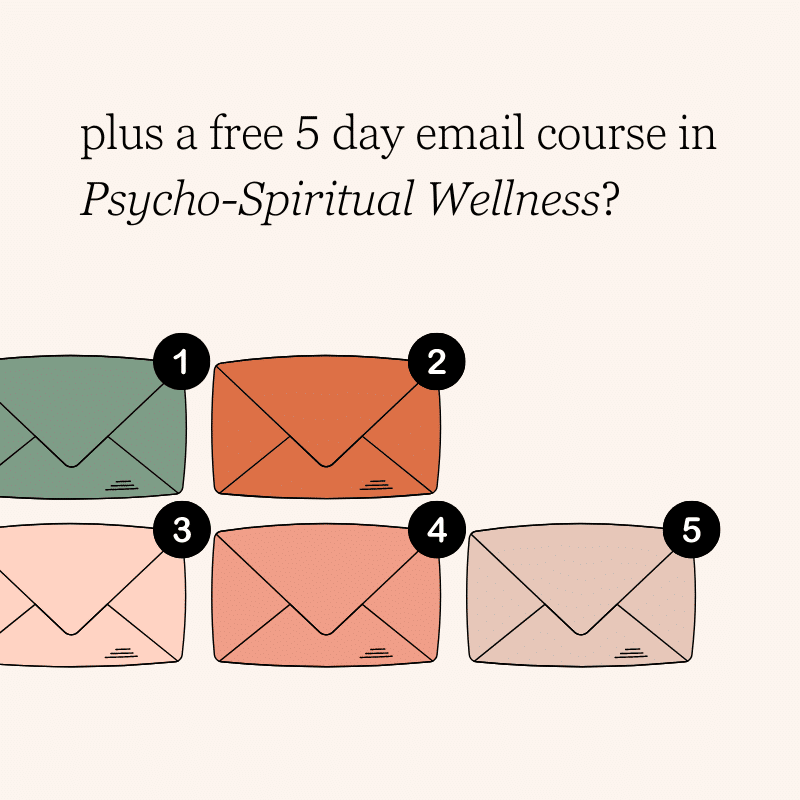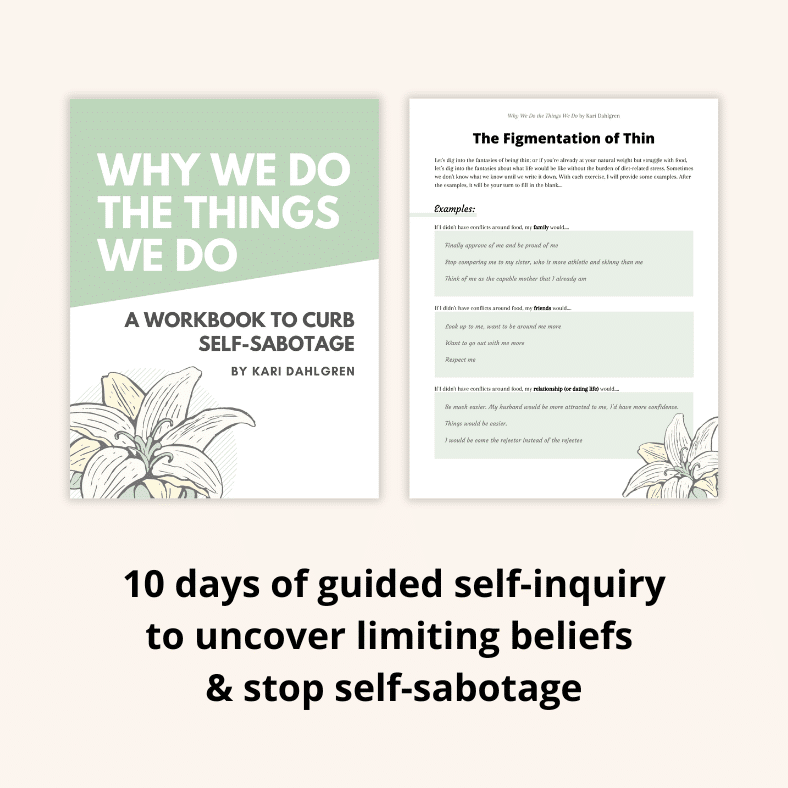
Emotional tolerance refers to your ability to sit still with discomfort instead of reaching for food, or anything else, as a buffer. Tolerance for negative emotion helps you become the eye of the storm instead of getting swept into compulsion.
When you feel lonely, for example, and you find yourself reaching for a bag of chips to fill the void, emotional tolerance helps you sit still with the edginess instead of buffering with those chips. This isn’t to say that chips are bad! All foods are equal. But in the realm of stopping compulsive eating, the goal is to stop the urge to eat without hunger — and emotional tolerance is the ticket.
Within Psycho-Spiritual Wellness, my approach to stopping compulsive eating far removed from dieting, I refer to emotional tolerance as the #1 skill, because it really is. Master this, and you’ll unlock enormous potential for making peace with food.
Let’s start by discussing why many of us lack emotional tolerance to begin with (hint: it’s not your fault; no one teaches this in school) and then I’ll share my favorite tool for harnessing this skill.
Why We Often Lack Emotional Tolerance
When you think of “emotional skills” what comes to mind? If you’re anything like me ten years ago, nothing immediately comes to mind and it even sounds a bit strange — and that’s precisely the society we live in today.
Emotional awareness and emotional tolerance are vital yet often overlooked skills. Many of us were raised in environments that solely promote happiness while also discouraging the expression of sadness. “Never let them see you sweat.”
When your emotional skillset is limited, it can lead to unhealthy coping mechanisms such as compulsive eating. The desire to eat without hunger is often an impulsive response to an uncomfortable emotion such as stress, depression, and sadness.[1] Low tolerance for discomfort (formally known as “distress tolerance” in clinical research) is significantly associated with emotional eating.[2]
If you want to address emotional eating, don’t turn to a diet, which merely focuses on food and exercise. Instead, turn to your emotions to directly address the root of the issue and discover an unexpected doorway into growth and authenticity.
Emotional Awareness Precedes Tolerance
Understanding your emotions on a moment-by-moment basis is the essence of emotional awareness, which is a prerequisite for emotional tolerance.[3] Emotional tolerance is the capacity to willingly experience the full spectrum of your emotions. You need emotional awareness in order to tolerate your emotions in the first place.
However, achieving emotional awareness can be challenging, especially if you were raised in an environment where showing vulnerability was discouraged, like “no crying allowed in this house.” Research shows that emotion-related self-regulation progresses rapidly in the first few years of life.[4] If your parents did not create an environment for this skill to unfold, don’t worry. Research also shows that you can play catch-up with this skill later in life. (That’s what I did.)
However, the blunting of emotional awareness isn’t just a familial issue; it’s perpetuated by societal norms that equate happiness with success and worthiness. This societal pressure is perhaps the most evident in romantic relationships, where many people express a singular desire: “I just want to be happy.”
However, this pursuit of happiness and only happiness is flawed. Life is an intricate tapestry of emotions, and negative feelings are an integral part of the human experience. The relentless avoidance of unhappiness only serves to intensify it — “what you resist persists” — creating a cycle of unhappiness, resistance, and compulsion.
How Emotional Intolerance Leads to Compulsive Eating
There’s a strong connection between negative emotion and overeating.[5], [6] Yet when people think of emotional eating, they often think of common scenarios like stress eating or boredom eating. However, the reality is that emotional eating can exist under seemingly unrelated thoughts like “I just love food too much” or “I just need more willpower.”
From personal experience, I can advocate that something as seemingly superficial as food addiction is still motivated by an uncomfortable emotion — it’s just hidden deep beneath the surface.
I will never forget the day that I stumbled upon this revelation. It was about two years into my journey of giving up dieting, and I found myself craving candy after lunch. I shrugged it off as sugar addiction and didn’t think much else of it. I also thought that I just loved candy more than the average person.
However, I was just delving into emotional work at the time, and out of flippant curiosity I sat down to dive into my emotions to see if something would pop up. Within two seconds, I burst into tears. I was sad and I had no idea. This is why, when someone tells me “yeah, it’s not an emotion, I just really like food” it can be difficult if not impossible to illustrate the emotion underneath. You need to witness the connection for yourself, and the following tool will help you get there.
How to Develop Emotional Awareness & Emotional Tolerance
Enhancing your emotional skillset is pivotal in addressing compulsive eating, and this is where my Stop, Drop, & Feel technique comes into play. This simple yet effective method, similar to urge surfing, is designed to foster emotional awareness and tolerance — and it can also help stop a binge in its tracks when you practice and sharpen these two emotional skills.
Here’s how it works: whenever you feel an urge to eat without hunger, pause and engage with the Stop, Drop, & Feel. This involves taking a moment to connect with your body and genuinely asking yourself what emotions you’re experiencing.

Just like any other skill, emotional skills improve with practice. Each time you repeat the Stop, Drop, & Feel, regardless of the immediate outcome (i.e. whether or not you stop a binge in its tracks), you’re exercising your ability to recognize and understand your emotions. It’s essential to acknowledge that the process of increasing emotional awareness is beneficial in itself.
Even if you still have the urge to eat without hunger post-SDF, the time spent wasn’t in vain. Every attempt contributes to strengthening your emotional awareness, ensuring you’re on the path towards overcoming compulsive eating the psycho-spiritual way.
Similarly, emotional tolerance is honed through repeated practice. The Stop, Drop, & Feel technique might not always halt a binge entirely, but that doesn’t diminish its value. The act of pausing to explore your emotions with curiosity and patience is a crucial step in refining both emotional awareness and tolerance.
With each practice, you’re not only becoming more adept at recognizing your emotions but also more resilient in facing them without succumbing to compulsion. This consistent effort is what will lead to a long-term solution to compulsive eating.
To fully equip yourself with the skills for stopping compulsive eating the psycho-spiritual way (aka, without dieting ever again) sign up for my most-loved online course: The Stop, Drop, & Feel Masterclass.
Making Peace with Food the Psycho-Spiritual Way
Emotional tolerance is a spiritual practice, because it involves being the eye of the storm and sitting still with discomfort. By embracing and practicing emotional tolerance through methods like the Stop, Drop, & Feel technique, you build the necessary emotional skillset to develop a more balanced, aware, and peaceful relationship with food and your emotions.
These days, when someone asks me what I want most from life, the last thing on my mind is “I just want to be happy.” Instead, I find myself answering, “I just want to live an authentic life.” One that involves the full spectrum of emotion, because that is where I’ve found the most peace and growth.
- Devonport, Tracey J et al. “A systematic review of the association between emotions and eating behaviour in normal and overweight adult populations.” Journal of health psychology 24,1 (2019): 3-24. doi:10.1177/1359105317697813
- Kozak, Andrea T et al. “Are overeating and food addiction related to distress tolerance? An examination of residents with obesity from a U.S. metropolitan area.” Obesity research & clinical practice 11,3 (2017): 287-298. doi:10.1016/j.orcp.2016.09.010
- Lane, Richard D, and Ryan Smith. “Levels of Emotional Awareness: Theory and Measurement of a Socio-Emotional Skill.” Journal of Intelligence 9,3 42. 19 Aug. 2021, doi:10.3390/jintelligence9030042
- Eisenberg, Nancy et al. “Emotion-related self-regulation and its relation to children’s maladjustment.” Annual review of clinical psychology 6 (2010): 495-525. doi:10.1146/annurev.clinpsy.121208.131208
- Sultson, Hedvig et al. “Exploring the role of momentary positive and negative affect in overeating and binge eating: Evidence for different associations among men and women.” Appetite 168 (2022): 105758. doi:10.1016/j.appet.2021.105758
- Wonderlich, Joseph A et al. “Negative affect and binge eating: Assessing the unique trajectories of negative affect before and after binge-eating episodes across eating disorder diagnostic classifications.” The International journal of eating disorders 55,2 (2022): 223-230. doi:10.1002/eat.23648


![best seller [cover of Why We Do the Things We Do]](https://karidahlgren-net.b-cdn.net/wp-content/uploads/2023/09/why-we-do-the-things-we-do-1.png)

Thank you
Thank you Kari, I’m so looking forward to trying this. I have been over weight most of my life and for the first time trying to really dig in to find out why . I always just told myself I really like food but after so many diets, which I always fail at , I’m finally willing to dig deeper and this makes so much sense to me. Tks again .
Thanks for the comment Brenda! I am celebrating your courage! This isn’t easy work, but it’s the most important.
Thank you Katie..
This is something new for me. I’ve struggled with diets since I was 16 (I’m 59). I want to work on allowing myself space for these emotions! Ok????
You seem like a downright warrior Brenda!
Hi kari
I tried your method and for a couple of weeks I felt free but then the old guilt came in and I decided to weigh myself which then led me to try calorie counting AGAIN . Yeah you’ve guessed it that broke down after two days and the whole wat do I do now started again . I would love to try your coaching and resources but alas finances do not permit this at present . I am looking into counselling as I feel my roots with food are so deep . Your emails are good and I’m reading those and trying to apply it . A
I really feel you on this, A. It is a vulnerable space to give up dieting, and it’s OK if we fall back into it! The point is that we tried, and now we are working on an entirely new skillset (emotional tolerance vs just more dieting). Don’t give up! Come back to it when you are ready and don’t beat yourself up. And feel free to keep me posted by responding to any of my newsletters 🙂 xoxo
Thank you for sharing . I will definitely try it.
I used a similar way to cure my panic attacks. I never thought to apply it to my binge eating. Blessings.
I am so glad that I could help you connect the dots! You already had the wisdom inside of you <3